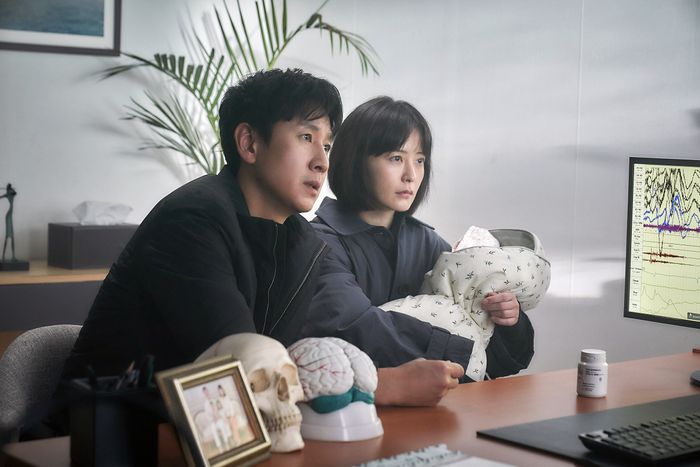
Hyun-su (Lee Sun-kyun), the male half of the married couple at the center of the devious horror comedy Sleep, suffers from a seriously disturbing case of somnambulism. But he otherwise enjoys the blissful slumber typically reserved for holy innocents. He drifts off easily and sleeps deeply, even when encased in the mummy bag and oven gloves meant to prevent him from unconsciously hurting himself. Sometimes, there’s even a hint of a smile on his dozing face, which starts to seem like more and more like an affront to his wife, Soo-jin (Jung Yu-mi), when she stays up watching him with a mixture of concern and fear. You can be in lockstep in every other area of your relationship, and still, sleep remains a kingdom that can only be entered alone. And when there, Hyun-su has a tendency to do upsetting things he has no memory of later, like stare into the darkness while muttering “Someone’s inside” or stand in front of the fridge eating raw meat. One night, he scratches his cheek until it’s gouged open, and that’s before the situation gets really dark — like, don’t get too attached to the pair’s little Pomeranian dark. Sleep is a film about parasomnia that’s really more about marriage — in particular, the idea that any relationship challenge can be overcome with enough dedication, even one that leaves you afraid that your partner is going to unwittingly do something terrible to your newborn daughter.
Sleep is the feature debut of Bong Joon Ho protege Jason Yu, though it’s also become notable in the time following its 2023 Cannes premiere for featuring one of the last onscreen performances from Lee, who died in December after becoming the center of a manufactured blackmail scandal. Lee’s suicide, which led to new scrutiny of South Korea’s high-pressure celeb culture and punishing media coverage, adds an unavoidable tinge of tragedy to a performance that’s as wickedly funny as it is frightening. In the U.S., Lee is best known for playing Park Dong-ik, the patriarch of the wealthy family in Parasite — a man who wasn’t a villain so much as the embodiment of an oblivious entitlement that made him an irresistible target for class rage. Lee’s playing a very different guy in Sleep, a struggling actor who appears to primarily get cast in background roles in TV dramas. But he still brings a touch of that plummy ease to the part of Hyun-su, who just seems to glide through life a little more smoothly than the anxious Soo-jin, who’s pregnant when Sleep begins.
Soo-jin, whose father split when she was young, puts more pressure on herself regarding the success of their marriage, which seems adorably supportive and affectionate. Hovering over a half-asleep Hyun-su at night, she demands to know if he still loves her even though she’s “bloated and ugly” and smacks him when he drowsily concedes he’s surrounded by pretty women at work. But Hyun-su is devoted, which makes his sleepwalking an even more confounding kind of betrayal, because it’s entirely unintentional. When awake, he’s a doting husband and, eventually, father. But when he drifts off, he becomes an unpredictable stranger menacing the sanctity of home, and the couple’s measures to deal with the issue go from being protective of him to protecting others from him as Soo-jin is increasingly on guard. Sleep is effectively a two-hander, with guest appearances from Soo-jin’s mother, a shaman, and the single mother who moves in downstairs. Jung is an able counterpart to the genial Lee, whose doggedness soon starts to take on an unhinged quality. Intellectually, Soo-jin understands her husband has a disorder and isn’t in control of his actions, but emotionally, she struggles not to blame him, a very human contradiction that Jung portrays touchingly.
The pleasures of Sleep come from the turns it takes but also from the deftness of Yu’s approach. The film is unpredictable because it feels like it’s formulating its journey in real time. And despite that, there’s care in its every intimate detail. Sleep may be modest, taking place largely in the one-bedroom Hyun-su and Soo-jin share, but that modesty is a strength, with every well-loved detail of the set reflecting the relationship the couple assumed was unshakably solid. Yu uses each foot of the confined space to his full advantage — a scene in which blood has been tracked across this place of cozy domesticity plays like a defilement — and shows how an intimate home can become a threateningly claustrophobic arrangement in a sequence in which Soo-jin seeks refuge in the bathroom, the camera mirroring her wary gaze. But it’s the sly way that the film starts off lodged in one character’s perspective, and makes its way to the other’s, that enables its rollicking final act to work as well as it does. Sleep is a wild ride, but it refuses to lose sight of the emotional state of the people it puts onscreen, even as they fall apart.
More Movie Reviews
- The Accountant 2 Can Not Be Taken Seriously
- Another Simple Favor Is So Fun, Until It Gets So Dumb
- Errol Morris Has Been Sucked Into the Gaping Maw of True Crime


